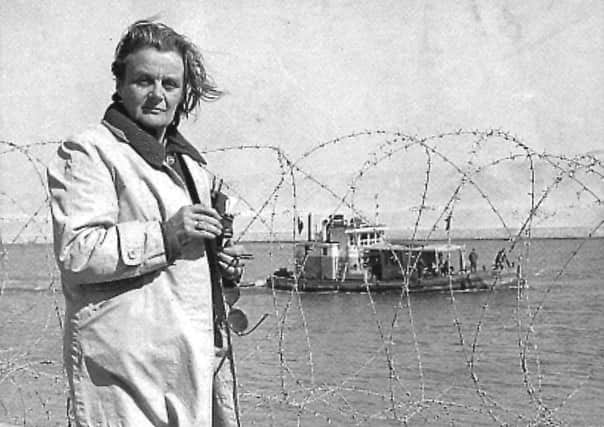Obituary: Clare Hollingworth OBE, war correspondent


The first few days of Clare Hollingworth’s journalism career read almost like something from Evelyn Waugh’s celebrated novel Scoop.
But while the path of nature columnist William Boot to war correspondent in the 1938 satire was an inadvertent comic journey, Hollingworth’s seat on the front row of history as German tanks prepared to roll into Poland, triggering the Second World War, was a triumph of fortune that immortalised her in reporting folklore.
Advertisement
Hide AdAdvertisement
Hide AdHollingworth was three days into her first journalism job in August 1939 when she gave witness to the Nazi armoured vehicles amassed in their hundreds, preparing to invade. Her first-hand testimony, at the age of 27, saw her scoop the world. The Daily Telegraph headline read: “1,000 tanks massed on Polish border. Ten divisions reported ready for swift stroke” – but she received no byline.
Hollingworth said the British embassy in Warsaw was so disbelieving of her account that she was forced to hold her telephone receiver out of her hotel window in Katowice for the diplomat to hear the “Wehrmacht” for himself.
She died, aged 105, blighted by poor sight and with severely limited mobility, while her memory loss was so pronounced she gave an interview to the Independent in 2016 in which she appeared to believe she was only one phone call away from her next foreign assignment.
Indeed, she ensured her passport remained up to date for such a commission, right until her death.
“I’ve been lucky so far,” she said. “I work hard. I enjoy action.”
Hollingworth credited her fascination with war to her father, and being taken on tours of famous battlefields – Naseby and Market Bosworth – during school holidays.
Her appetite for foreign journalism was brought to life after a chance encounter with the Telegraph editor in the summer of 1939, and the beginner from Knighton in Leicestershire found herself immersed, solo, in a first and largely career-defining post.
Her Telegraph reports came after she had headed up a charity in Europe credited with saving thousands of refugees from the Nazis’ clutches.
Advertisement
Hide AdAdvertisement
Hide AdShe would go on to report from conflict zones in Palestine and Vietnam, the Chinese cultural revolution and the Algerian civil war, and was credited with the first and last interviews with the Shah of Iran.
Hollingworth married twice, first to writer Vandeleur Robinson, the second time to Times journalist Geoffrey Hoare, who gave her a stepdaughter – she dismissed the thought of having children of her own, instead wanting to devote her time to work.
She was posted to China in 1973, and spent the rest of her career in Asia.
Hollingworth moved to Hong Kong in the 1980s and it was there that she spent her final days, whiling away time at the Foreign Correspondents’ Club, where she would fix a pair of headphones to her ears and tune in to BBC broadcasts.
In an interview with the Telegraph in 2011 she said she always “enjoyed” being involved in war.
“When I was very small, in World War One, I used to hear people talk about the battles, and I did become extremely interested in warfare,” she said.
“I’m not brave, I just enjoy it.”
RYAN HOOPER